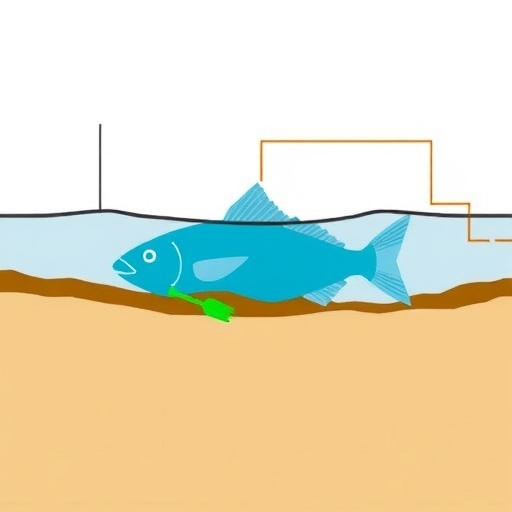In recent years, the global push for sustainable waste management techniques has garnered increasing attention, particularly in the realm of organic waste. The co-digestion of organic waste presents an innovative approach wherein two types of organic materials are combined to enhance the efficiency of anaerobic digestion processes. A recent study conducted by Noh, Shin, and Cheon delves into the complexities of anaerobic co-digestion, specifically focusing on the combination of fish waste and primary sludge.
This research highlights not only the biochemical potential for methane production but also investigates the optimal mixing ratios to maximize yield. Fish waste, often considered a problematic byproduct in the aquaculture industry, is rich in nutrients and organic matter. When expressed as a co-digestate with primary sludge from wastewater treatment facilities, fish waste has the potential to bolster biogas production significantly. The findings presented in this study are crucial for advancing our understanding of how diverse waste materials can synergistically enhance renewable energy production.
Within the study, the authors conducted a series of experiments to assess the biochemical methane potential (BMP) of the combined substrates. They meticulously designed their methodology, ensuring a comprehensive analysis of varying mixing ratios. This systematic approach allowed them to determine the optimal conditions for biogas production, where the fermentation characteristics of the feedstocks were closely monitored. The insights obtained from these experiments can pave the way for optimizing anaerobic digestion facilities, enabling them to process fish waste more effectively while also improving the overall sustainability of biogas production.
Methane, as a critical renewable energy source, holds substantial importance in our efforts to reduce greenhouse gas emissions. This study identifies that methane generation from the anaerobic digestion of organic waste not only addresses waste management challenges but also provides energy that can be utilized in various applications. The results indicate a promising correlation between specific mixing ratios of fish waste and primary sludge, unlocking potential pathways for large-scale energy recovery systems.
The implications of this research extend beyond simply increasing biogas yield. By integrating fish waste into the anaerobic digestion process, operations can achieve a more stable digester performance. The metabolic processes carried out by anaerobic microbes benefit from the high nutrient content found in fish waste, potentially leading to higher operational efficiencies. Furthermore, this form of waste reutilization plays a pivotal role in environmental conservation, as it aids in reducing the volume of organic waste that would otherwise contribute to landfill overflow and marine pollution issues.
Moreover, the study provides a comprehensive analysis of the kinetics of the anaerobic digestion process when subjected to the addition of fish waste. In their findings, the authors discuss how the diverse microbial communities can adapt to varying substrates, enhancing the degradation rates of organic materials. This adaptability is instrumental in creating a resilient digestive environment, where fluctuations in substrate composition can be successfully managed without compromising biogas productivity.
Understanding the economic feasibility of implementing co-digestion practices is also a crucial aspect that the authors addressed. With the rising costs of energy production combined with the challenges of effective waste management, their research offers insights that can drive policy changes and incentive structures to support anaerobic digestion projects. By harnessing the complementary nature of fish waste and primary sludge digestion, municipalities and industries can create a viable pathway towards sustainable waste-to-energy systems, thus contributing to our transition towards a circular economy.
The researchers are optimistic about the broad applicability of their findings. They propose that the successful co-digestion of fish waste and primary sludge could serve as a model for other organic waste combinations, encouraging further exploration into diverse biowaste resources. By promoting an ecosystem approach to waste management, industries can move towards practices that not only seek to minimize waste but also optimize energy production from various organic materials.
As the global community seeks effective strategies to combat climate change, the results of this research underscore the importance of innovative waste management solutions. The anaerobic co-digestion of organic waste represents a transformative potential, positioning itself as not only a viable waste treatment option but also a critical contributor to renewable energy portfolio diversification.
The natural convergence of waste management and energy recovery signifies a brighter, more sustainable future. The authors celebrate this interdisciplinary synergy, suggesting that whether we focus on improving rural agricultural practices or enhancing urban waste treatments, a combined approach brings forth exceptional opportunities for success. The unfolding narratives of co-digestion illustrate how we can turn challenges into productive outputs, leading us towards a sustainable economy where waste is simply a resource in disguise.
In conclusion, the groundbreaking insights shared by Noh et al. play a pivotal role in shaping the future of anaerobic digestion and waste management. By focusing on the efficient utilization of fish waste alongside primary sludge, their research illuminates the path forward for industry advancements and comprehensive energy solutions. This collaborative effort between researchers, waste managers, and policymakers is essential to harnessing our waste potential and progressing toward an environmentally sustainable future propelled by renewable energy technologies.
Subject of Research: Anaerobic Co-digestion of Fish Waste and Primary Sludge
Article Title: Anaerobic Co-digestion of Fish Waste and Primary Sludge: Biochemical Methane Potential and Mixing Ratio
Article References:
Noh, E.J., Shin, S.G., Cheon, J.L. et al. Anaerobic Co-digestion of Fish Waste and Primary Sludge: Biochemical Methane Potential and Mixing Ratio. Waste Biomass Valor (2025). https://doi.org/10.1007/s12649-025-03344-7
Image Credits: AI Generated
DOI:
Keywords: Anaerobic digestion, fish waste, primary sludge, biochemical methane potential, co-digestion, renewable energy, waste management, sustainable practices
Tags: anaerobic co-digestion of organic wasteaquaculture waste management solutionsbiochemical methane potential analysisenhancing biogas yield through co-digestionexperimental methodologies in anaerobic digestion researchfish waste utilization in biogas productionnutrient-rich organic waste processingoptimizing methane production from wasteprimary sludge and fish waste mixing ratiosrenewable energy from anaerobic digestionsustainable waste management techniqueswaste-to-energy innovations





